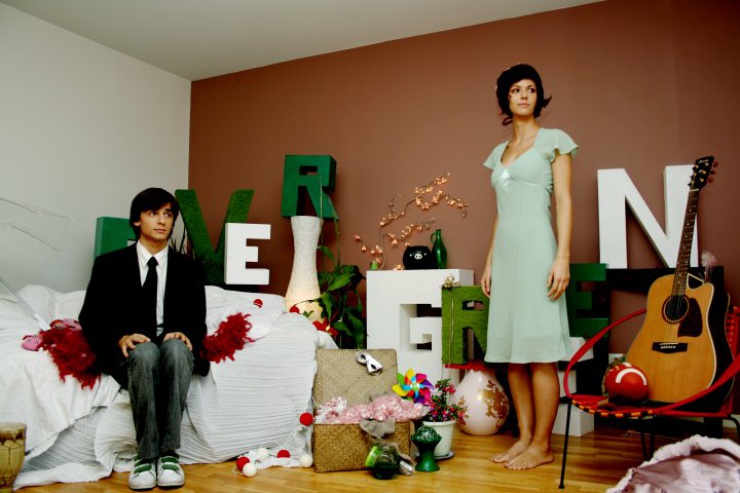
French trio We Were Evergreen on life in London: 'You can feel the difference'
Published on
Translation by:
lydia nockelsFrench bands are currently churning out sad song after sad song, but these folks are not having their audiences reaching for the antidepressants. The London-based trio have delivered the perfect remedy for the transition into autumn with their debut EP, Flings, without making you want to throw yourself out of a window
France isn't doing too well. The message has become a concept amidst economic columnists, and has also spread to the new bands which inundate music download platforms. Aline, Concorde and Lescop are just some of the French groups who are singing about the recession: my analysis is that 1980 was the year of chaos, whilst greyness is my true love. Not a day goes by without a piece produced by record labels with ironic names like Pop Noire - literally 'black pop' - that mentions a girl drowning herself in the Normand-Breton Gulf.
Love of sunshine pop
It seems like people are never more creative than they are in times of crisis. This is why the 1980s gave birth to such movements as 'new-wave', pegged as a French phenomenon; it has less to do with electronic arrangements and more to do with unemployment. In 201010.2% of the working population were unemployed. Any conscious artist opening their paper on a morning has to be aware that to describe their era, they must sing about the economic crisis. But then the equation becomes a little bit risqué: what role do we give those who sing about life? With autumn in full blaze, it's a serious question if we want to stop young people from suicidal tendencies.
Fortunately, there is one group who bring a bit of joy to this melancholy environment. We Were Evergreen emerged in the middle of 2012 with Flings, an EP containing four tracks which flourish with happiness. Vintage Car and Summer Flings would be the perfect soundtrack for a summer road trip.

We Were Evergreen performed at a short concert during the Parisian Solidays music festival in June which, judging by how the big tent filled up, was appreciated. FabienneDébarre, the pianist, is overjoyed. Dressed in denim dungarees, she’s all smiles, frantically tapping on a water bottle she has in her hand. Guitarist Michael Liot is more serious, answering with crossed-legs and sometimes clasping his hands when asked a question. The third band member, drummer William Serfass, isn’t there. Asked to explain the light mood and the apparent candour created by their music, the two founding members retort: 'It must come from the pleasure we experience playing together, the three of us. After all, you have to know, this is not something that we’ve claimed. We like cute and naive, but we didn’t want to do something cute and naive...' Criticism tends to shut the group, who met at the conservatoire de musique in Paris, right up.
Because We Were Evergreen use childhood-friendly instruments - a xylophone and a ukulele amongst others – the majority of the media associate their songs with those of Cocoon (a French band), or accuse them of being influenced by a summery pop scene. 'It just makes us look shit,' says Fabienne. We Were Evergreen define themselves as 'an alternative indie-electro-pop Parisian group'. Only the word 'Evergreen' could betray the imahe of a ritornellos, or constant song, according to its literal translation, being enjoyed during an outdoors picnic, as we open the pâté with a blade of grass between our teeth.
Sweet France
This is maybe where the shoe pinches. Stitched with apocalyptical hymns, the France of the enlightenment can only find spirited productions which talk about Penguins and MoonBoots silly. This is undoubtedly the reason why the band decided to move to England in September 2011. 'Since we’ve been living in London, we’ve become a lot more open,' explains Fabienne, who sounds like the Belgian actress Cécile de France. 'Lots of English people think it’s a shame that foreign groups sing in English, but they can then identify with us more. The fact that there are so many people of our generation who sing in English proves that there was a kind of hole in French songs, and that what was happening in England and the United States in the 1990s was much more exciting.'
'The fact that there are so many people of our generation who sing in English proves that there was a kind of hole in French songs'
As proof, since the three musicians have been living in Paddington in west London, they have thanklessly gone about their musical experiences and are now able to compare British effervescence to French dreariness. 'You can feel the difference,' says Michael. 'The festivals, for example, are a lot better in England. Solidays is good but boxed-in. You have the big tent, food stands and that’s it. Here, you have everything in the countryside where people dress up and have pillow fights. At festivals like secret garden party there’s an island in the middle. You have to get on a boat to go to the gig. At the end the people set a huge dragonfly on fire to make a bonfire.' We Were Evergreen are fans of absurdity and animal heads – images which are very present in the video for Vintage Car. 'Having this freedom in a super-fossilised French context where everything has to be formatted,' as the band explain it, helps put a damper on austerity.
Images: main courtesy of © We Were Evergreen official facebook page/ © Rob Clayton/ videos (cc) WeWereEvergreen/ youtube
Translated from We Were Evergreen : God save the spleen



